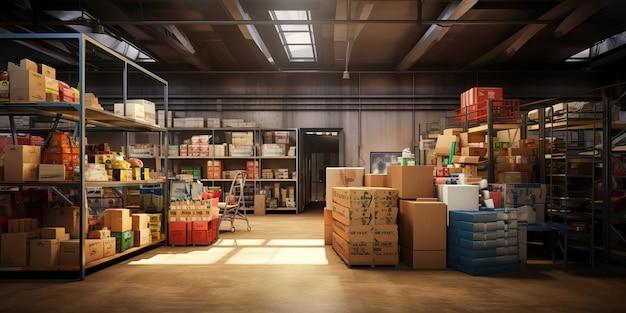
The food and beverage industries thrive on freshness. From delicate fruits and vegetables to aged cheeses and craft beers, maintaining proper storage conditions is crucial for preserving quality and maximizing profit.
But, keeping your food and beverages fresh and flavorful isn't just about proper packaging and handling. It's about choosing the right storage solution.
Fortunately, the days of generic warehouses are over. Today, specialized facilities cater to the unique needs of perishable goods, ensuring optimal conditions and minimizing spoilage.
This guide explores five specialized warehouses designed to keep your products at their peak, ensuring your customers receive the best possible experience.
- Cold Storage Warehouses:
These are the workhorses of the industry, offering temperature-controlled environments ranging from slightly chilled to sub-zero freezing. Ideal for fruits, vegetables, dairy products, and meats, cold storage warehouses ensure consistent temperatures and prevent spoilage.
- Controlled Atmosphere Warehouses:
Take temperature control a step further with controlled atmosphere (CA) storage. These warehouses use specialized technology to manage oxygen, carbon dioxide, and humidity levels, creating an ideal environment for specific products like fruits and vegetables, extending their shelf life significantly.
- Blast Chilling and Freezing Facilities:
Need to quickly cool down large quantities of product? Blast chilling and freezing facilities are your answer. Their rapid cooling capabilities are perfect for preserving the freshness and quality of items like seafood, meat, and prepared meals.
- Dry Storage Warehouses:
Don't underestimate the power of dry storage! These warehouses are designed for non-perishable goods like grains, legumes, and packaged foods, offering controlled temperature and humidity to prevent spoilage and maintain quality.
- Value-Added Warehousing:
For a complete solution, consider value-added warehousing. These facilities go beyond storage, offering services like packaging, labeling, kitting, and even light assembly. This can streamline your supply chain and reduce costs.
By continually innovating and adapting, the food and beverage industry can ensure that freshness remains its defining characteristic, delighting consumers and creating a more sustainable future.
Additionally, it's important to acknowledge the challenges:
- Cost: Specialized storage and sophisticated technology can be expensive, putting pressure on smaller businesses.
- Food Safety: Maintaining proper sanitation and hygiene throughout the storage process is critical to prevent foodborne illnesses.
- Regulations: The industry must navigate a complex web of regulations regarding food safety, temperature control, and environmental impact.
Despite these challenges, the food and beverage industries are continuously striving to optimize its storage practices, ensuring not only delicious and nutritious products but also a responsible and sustainable future for the industry.
Finding the Right Fit in Houston:
Before choosing your warehouse space you must consider factors like product requirements, volume, location, and budget. Research local options, including warehouse space for lease in Houston, and consult with experienced professionals like Samuel L. Bryant Investments for tailored recommendations.
The right warehouse partner can be a game-changer for your food and beverage business, ensuring freshness, safety, and profitability.
By understanding the different options and exploring the resources available in your area, you can ensure your food and beverages reach consumers in peak condition, every time.
